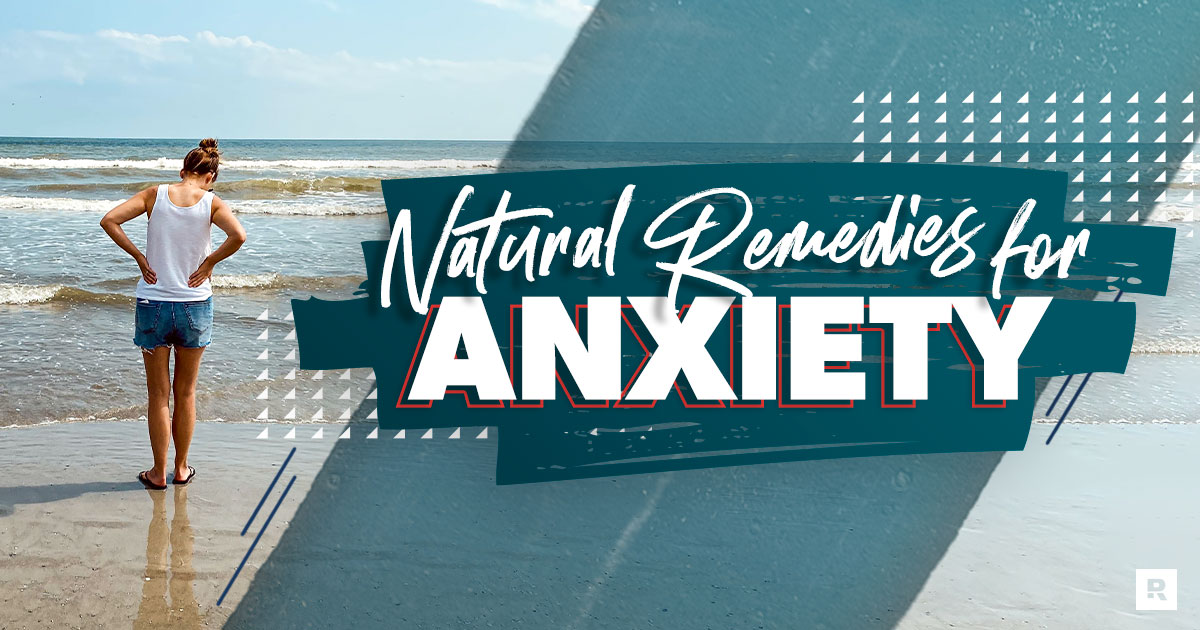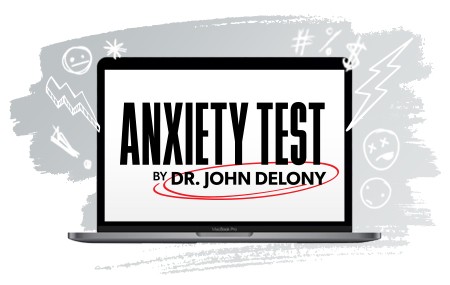
If life’s got you feeling tired and wired and stressed even though everything looks “right” on the outside, you’re not alone. And while this isn’t new news, I need to say it: Our bodies haven’t caught up to modern society’s demands and pace and constant keeping up with the Joneses. As a result, millions and millions of Americans are experiencing an inner smoke alarm going off in the form of anxiety. But even though our fast-paced, modern lifestyles can easily push wellness to the wayside, there’s good news: You can begin building a non-anxious life. And you can start by exploring natural ways to reduce anxiety.
What Is Anxiety?
In short, anxiety is a natural response to stress that shows up as your “fight, flight or freeze” response. It often comes along with symptoms like a racing heart, shortness of breath, sleeplessness and racing thoughts (among other things). Modern medicine and mainstream media will try to convince you anxiety is a disease—all the while shoving disaster news headlines and internet clickbait in front of your eyeballs and into your eardrums 24/7.
Get expert money advice to reach your money goals faster!
But here’s the thing: Anxiety isn’t a disease.
It’s not.
Anxiety is your body’s way of keeping you safe, like a smoke alarm getting your attention as the toaster oven incinerates a frozen pepperoni pizza. It’s a natural response that signals something in your life needs attention . . . right now!
10 Natural Remedies for Anxiety
The 10 natural ways to reduce anxiety I’m about to list are meant to help you start building a foundation of wellness and create a non-anxious life. And while these natural anxiety remedies might sound overly simple, they can really help your body learn peace, safety and calm. But understand that the process to becoming well will look different for everyone. While one person could find success working with a therapist, someone else might heal from anxiety by cutting out caffeine. So focus on what works best for you.
First, inhale. Now, exhale.
Ahh.
You are worth being well. Let’s get started.
1. Get your body moving.
Your body is where anxiety makes itself known, and it’s where you can help turn down the alarms. That’s why movement is such an important tool to help relieve anxiety naturally. You don’t have to break a world record for powerlifting or climb a Colorado fourteener in a blizzard to feel the benefits of physical activity. Gentle movement every day can be enough to start feeling better. Here are just a few activities you can do this week:
- Go for a walk around the block (and say hi to your neighbor while you’re at it).
- Take a Zumba class at your local YMCA.
- Do some push-ups on the living room floor.
- Dust off those P90X DVDs and do a workout in the garage.
- Chase your kids on the playground.
- Play fetch with your dog.
- Dig holes in the backyard to start a garden.
- Lift some weights—heavy ones.
- Chop firewood (if you live in the sticks like me).
And if the most you can muster is a few gentle stretches on the couch or in bed when you wake up, do that. Every little bit counts. Here’s one of my favorite exercises: Lay perfectly still on the floor. Beginning with your toes, tense your muscles for two or three seconds, then release. Moving up your body, repeat this exercise, tensing and releasing your ankles, calves, quads, and so on, all the way up to your face muscles. Then repeat the process from the top down, starting with your face and ending with your toes.
2. Go outside.
Stanford University professor Dr. Andrew Huberman strongly recommends getting morning sunlight, unfiltered by windows or sunglasses, every day.1 Even on cloudy mornings. In addition to the sunlight, exposing your body to different temperatures is deeply important. Move your body outside in the morning, at night, in the rain, and even in the snow flurries. Time in nature does a body good. And remember, friends, there’s no such thing as bad weather—only bad clothes. Zip up your parka or cut off your sleeves and get out there.
3. Make the healthiest food choices you can afford.
Food prices are through the roof, and it might seem cheaper to raise a brood of chickens in the backyard than buy a dozen eggs at the grocery store these days. But no matter what your grocery budget looks like, do your best to buy and eat food that’s good for you. I’m talking fruit and veggies, meat and fish, that sort of thing. I’m not suggesting you jump on the hottest new diet bandwagon like I used to do. (One month I was keto, then vegan, and on and on and on.) Food is a powerful source of nutrients that can support your mental health, and a diet with plenty of servings of fruit, vegetables and protein has been shown to reduce symptoms of anxiety and depression.2
4. Make some friends.
We can’t do life alone, and we’re living in an era of extreme isolation and loneliness. I don’t care if you meet your wackadoodle artist neighbor for a cup of organic mushroom coffee once a week or join a co-ed softball league through your local community center—you need people around to do life with.
Maybe the family you grew up in wasn’t the safest (especially if you experienced one too many blow ups). Maybe you get some social anxiety that makes meeting new people feel like plucking out your nose hairs with a pair of pliers.
But no matter your personality type or Enneagram number or whatever relationship hurts you’ve experienced in the past, you’ve got to connect with other humans. You’ve got to! Relationships are the emergency fund for your life. It’s time to practice being human with other humans—together, right now. (And if you need help jump-starting the conversation, check out my Questions for Humans Conversation Cards.)
Free Anxiety Test
This test will help you get clarity on the situations that could be contributing to your feelings of stress, anxiety and burnout.
5. Switch your daily coffee to half decaf—or cut caffeine out altogether.
A few years ago, my friend went to the doctor because she was having anxiety symptoms: shaking, racing thoughts, and restless sleep (if she could even fall asleep). Her counselor first recommended she cut out her insane caffeine intake—and like magic, her anxiety disappeared. It turned out she was drinking too much coffee during the day, and the caffeine was overstimulating her body. Cue classic anxiety symptoms. I know a cup of coffee is a daily staple for a lot of folks (I’m a six or seven cup kind of guy), but if you’re experiencing nonstop anxiety symptoms, try lowering the amount of coffee (or energy drinks or soda or anything else with caffeine) you consume in a day.
6. Explore alternative therapies, like massage, acupuncture and breathing techniques.
If you’re curious about the best natural remedies for anxiety, consider alternative therapies, like massage, acupuncture and breathing techniques. In our modern culture, we’re starving for human touch, especially safe skin-to-skin contact. We’ve also become shallow, irregular breathers, and we hold tension all along our bodies. Massage, human contact, and breathing techniques (I personally use Wim Hof breathing methods) have a profound impact on your body’s ability to regulate itself and quiet your anxiety alarms.
7. Let your mind rest for a few minutes.
You might be thinking, But Delony, I’m riddled with anxiety and racing thoughts! My mind won’t turn off! Hey, I hear you, and I know what that’s like. Believe me. Whether you’re a person of faith, and prayer is your second language, or you’re brand new to spirituality and mindfulness practices, I want you to start taking a few minutes a day to let your mind be quiet. This can look like meditating for a few minutes a day, focusing on taking a few deep breaths, or making prayer a new daily habit.
And remember: Mindfulness and prayer aren’t practices you can be good or bad at. In our competitive culture, it’s easy to compare our abilities in these areas—but that will only add to your anxiety. Mindfulness and prayer are about being still, surrendering, witnessing the world, and tuning in to a higher power. And don’t worry, you’ll get the hang of it over time.
8. Write down your worries in a journal.
Go to your local Walmart or CVS today and pick up a notebook for a couple bucks. I want you to carry it around with you, and anytime you feel overwhelmed by racing thoughts, shame, judgment or frustration because you’re the worst human in the world for spilling your coffee on the office floor, write down that thought. Write it down and demand evidence that it’s true. I’m willing to bet 99.9% of your anxious thoughts are feelings, not facts—and when the alarms are ringing, facts are your friends. Seeing your thoughts on paper will help you get some distance so you can understand just how true (or untrue) they really are. Are you really the worst human in the world for spilling your coffee on the office floor? Nope—not by a long shot. Writing your thoughts will help you see—and feel—the truth.
9. Get some sleep.
Please trust me: I wish there was another way to be well outside of getting lots of restorative sleep. But there’s not. I’m a busy guy with a wife, two kids, two dogs, and too many chickens. I know how hard it is to make sleep a priority. I also know if you’re a mom with toddlers, a shift worker, or a first responder, sleep is often the last thing you’ve got time to do (especially when your brain is constantly planning your zombie apocalypse survival strategy or scanning the news for the latest report of mysterious balloons floating through the air). But there’s simply no way around it: Sleep is essential to our body’s rest and repair—including healing from anxiety. Here are some ways you can start to improve your sleep and heal anxiety:
- Turn off your screen at least an hour before bed.
- Stop drinking caffeine after 10 a.m. (I know, I know . . . don’t shoot the messenger).
- Keep your bedroom temperature cool.
- Get blackout curtains to keep the room dark.
- Turn on a white noise machine or soothing music.
- Journal or read a book before bed.
10. Try calming herbs, supplements and hydration.
I don’t recommend anxiety medication for everybody, even though it can help turn down the alarms. (That’s something you’ll need to talk about with your doctor.) But if you’re curious about herbs and supplements you can purchase over the counter, try chamomile tea, high-quality fish oil, magnesium, and even more direct supplements, like Theanine and GABA, for starters. These natural ingredients have been shown to reduce symptoms of anxiety and depression in people experiencing generalized anxiety disorders.3,4 Also, make sure you’re drinking enough water (many folks are chronically dehydrated). And, of course, never take any sort of supplements or herbs without first checking with your doctor!
Learn More About Healing Anxiety
As someone who’s helped thousands of people just like you and me walk through the process of healing anxiety, I’m confident you can take the steps to create a non-anxious life. If you’d like to learn more about the Six Daily Choices you can make to live a more peaceful, joyful and non-anxious life, check out my new book, Building a Non-Anxious Life. Start reading it for free today. You’re worth being well.




